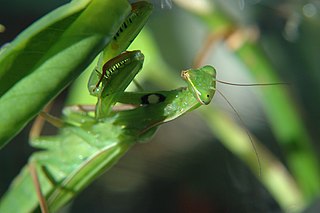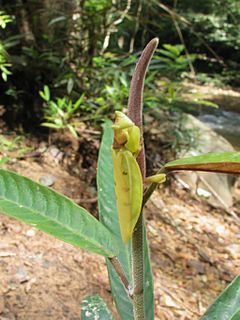
Mantidae is one of the largest families in the order of praying mantises, based on the type species Mantis religiosa; however, most genera are tropical or subtropical. Historically, this was the only family in the order, and many references still use the term "mantid" to refer to any mantis. Technically, however, "mantid" refers only to members of the family Mantidae, and not the 14 remaining families of mantises. Some of the most recent classifications have promoted a number of the mantid subfamilies to the rank of family, e.g. Iridopterygidae, Sibyllidae, Tarachodidae, Thespidae, and Toxoderidae, while other classifications have reduced the number of subfamilies without elevating to higher rank.

Empusidae is a family of plant-mimicking mantises, consisting of 10 genera, holding almost 30 species. Unlike many other mantis families, the Empusidae are a monophyletic lineage. Empusidae mantises are ambush predators, with mouthparts adapted to feeding on other insects and small animals. The majority of Empusidae species are distributed throughout Africa, but they are also found in Southeast Asia and in the southern parts of Europe.

Chaeteessidae is a family of praying mantises. It contains a single extant genus, which is thought to have diverged from the rest of the order relatively early in the evolution of the mantises.

Metallyticus is a genus of praying mantis. It is the only genus in the monotypic family Metallyticidae. They are mostly found in South-East Asia. The species of the genus are dark, somewhat flattened and cockroach-like, and often with a cuticle that is reflective and metallic in appearance.

Mantoida is a genus of praying mantises in the family Mantoididae. The species of this genus are native to Mexico, Central America, and South America.

Amorphoscelidae is a family of mantises in the order Mantodea.

Hymenopodidae is a family of the order Mantodea (mantises), which contains six subfamilies. Some of the species in this family mimic flowers and are found camouflaged among them; these are called flower mantises. Their coloration is aggressive mimicry, luring prey to approach close enough to be seized and eaten.

The genus Mantis is in the family Mantidae, of the mantis order Mantodea.

Metallyticus splendidus is a rare species of praying mantis found in Southeast Asia. It has an iridescent appearance.

Iris is a genus of praying mantis found in Africa, Asia, and Southern Europe with one species, Iris oratoria, being introduced to North America in the south-western United States.

Rhombodera is a genus of praying mantises native to Asia and possessing common names such as shield mantis, hood mantis, and leaf mantis because of their extended, leaf-like thoraxes.
Alalomantis muta, common name Cameroon mantis, is a species of praying mantis native to West Africa.
Hierodula sternosticta is a species of praying mantis in the family Mantidae.

Tarachodidae is a now obsolete family in the order Mantodea, of genera found in Africa and Asia.

Acanthopidae is a family of mantises consisting of 16 genera in the order Mantodea. The group was first formally split off as a separate family by the German entomologist Reinhard Ehrmann in 2002. In 2016, five genera were moved from Acanthopidae to the newly created family Acontistidae, but this has not been accepted in most recent classifications.

Mantises are an order (Mantodea) of insects that contains over 2,400 species in about 460 genera in 33 families. The largest family is the Mantidae ("mantids"). Mantises are distributed worldwide in temperate and tropical habitats. They have triangular heads with bulging eyes supported on flexible necks. Their elongated bodies may or may not have wings, but all Mantodea have forelegs that are greatly enlarged and adapted for catching and gripping prey; their upright posture, while remaining stationary with forearms folded, has led to the common name praying mantis.

Helvia is a genus of praying mantises in the family Hymenopodidae found in Southeast Asia. It is monotypic, being represented by the single species, Helvia cardinalis.

Galinthiadidae is a family of 24 African mantis species in four genera.
Dactylopterygidae is a family of praying mantises, based on the type genus Dactylopteryx. The first use of "Dactylopterygidae" was by Giglio-Tos and it has recently (2019) been revived as part of a major revision of mantis taxonomy; three genera have been separated from others in the subfamily Liturgusinae and moved here from the family Liturgusidae.













